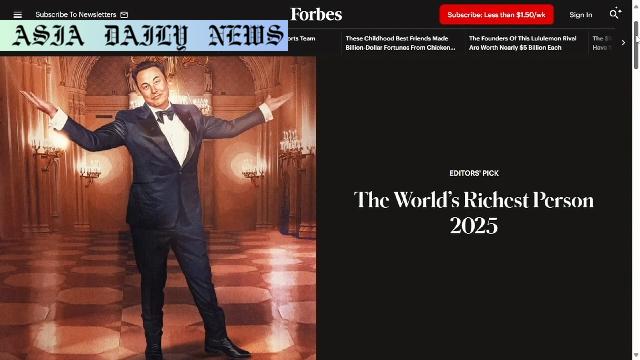Musk regained the top spot for the first time in three years with an estimated net worth of 342 billion dollars.
Elon Musk reclaims the title of world’s richest person, worth $342 billion.
SpaceX and xAI’s success added $147 billion to his wealth this year.
Tesla shares face challenges but remain higher than last year.

Elon Musk Tops Forbes List of Billionaires
Elon Musk, CEO of Tesla and SpaceX, has once again seized the crown as the richest individual in the world, according to Forbes’ 2023 ranking. With an astounding net worth of $342 billion, Musk’s financial ascent marks the culmination of a lucrative year powered by increasing valuations for SpaceX and his tech venture, xAI. Forbes reported that these two enterprises alone elevated his fortune by an impressive $147 billion within the last year, a testament to Musk’s prowess in leading transformative industries.
Three years after last claiming the top spot, Musk’s financial rejuvenation comes amid challenges, including reported Tesla stock volatility and criticisms surrounding his role as the head of the Department of Government Efficiency (DOGE). Nevertheless, his ventures in renewable energy, pioneering space exploration, and artificial intelligence continue to anchor his prominence.
The Power Behind SpaceX and xAI
Among the key drivers behind Musk’s resurgence are the surging market valuations for SpaceX and xAI. SpaceX remains the undisputed leader in private space exploration, carving pathways for accessibility to space journeys and missions targeting Mars colonization. Meanwhile, xAI, Musk’s artificial intelligence initiative, bolsters his stake not only as a business magnate but as an influential figure in shaping humanity’s technological trajectory. The $147 billion increase in his valuation stems from the holistic growth of these enterprises, reaffirming Musk’s ability to navigate and dominate tomorrow’s industries today.
Ironically, this growth contrasts sharply with Tesla, which has witnessed share selloffs and acts of vandalism against its products in various U.S. locations. Yet, Tesla shares still trade higher compared to last year, reflecting enduring investor confidence in Musk’s electrified vision of the future.
Musk’s Controversial Role in DOGE and U.S. Government Efficiency
Musk’s ascension isn’t without debate. His leadership as the head of the Department of Government Efficiency (DOGE) has drawn both applause and ire. His aggressive policies to trim U.S. government expenditures and reorganize agency functions have met resistance. However, supporters of these measures praise Musk for attempting to optimize governmental operations by introducing business-like efficiency in governance.
In contrast, critics argue that his directives have led to chaos, job shortages, and palpable uncertainty for government workers. The polarizing impact of these initiatives reflects Musk’s ethos of prioritizing efficiency and innovation, sometimes to the detriment of traditional systems. His leadership philosophy invites ongoing conversations about modernization versus stability.
Future Challenges and Opportunities
Despite controversies, Musk’s achievements underscore his ability to turn seemingly audacious visions into reality. From sustainable vehicles to reusable rockets, and now artificial intelligence, Musk’s legacy is intertwined with innovation. However, his aggressive nature and polarizing leadership face continuous scrutiny.
2023 is shaping up as a defining year for Musk, as he navigates Tesla’s stock recovery, sustains SpaceX growth, and integrates xAI into the broader tech ecosystem. His narrative emphasizes the complexities of modern leadership and how innovation serves as both a challenge and a solution for global systems.



Commentary
Elon Musk: An Icon of Innovation or a Polarizing Leader?
Elon Musk’s reemergence as the world’s wealthiest individual once again places him in the limelight for his unparalleled achievements in both tech advancements and wealth accumulation. Musk’s journey to success is not only defined by numbers but by his ability to confront and overcome industry stagnation. Whether it’s revolutionizing electric vehicles, building rockets capable of interspace travel, or engaging in artificial intelligence, Musk exhibits a clear focus on changing the world, one industry at a time.
The Musk Paradox: Visionary Yet Controversial
Musk’s name sparks intense reactions. Admirers view him as a genius with an ambitious vision, while critics question his methodology and ethical framework. His position as head of the Department of Government Efficiency is a shining example of this paradox. While his attempts to improve operational efficiency in government agencies are commendable, especially in saving costs, it comes at the expense of workforce morale and perceived stability. Such dilemmas encapsulate why Musk remains such a polarizing figure.
His integrity is particularly tested by recurrent issues like Tesla share volatility and public dissatisfaction. The acts of vandalism targeting Tesla vehicles reflect the broader challenge he faces in connecting with those beyond his immediate supporters or shareholders.
Balancing Innovation and Responsibility
As Musk ventures further into areas such as AI, he must balance his innovative ethos with his expanding social responsibilities. SpaceX and xAI demonstrate his forward-thinking abilities, yet they underscore his growing accountability to stakeholders, governments, and citizens worldwide. The next frontier for Musk is not merely technological advancement but fostering trust, unity, and responsibility in a divided world.
Love him or hate him, Elon Musk has proven to be an essential figure in shaping the present and the future. His journey serves as a critical study in leadership, innovation, and the broader impact of wealth and influence.